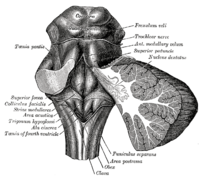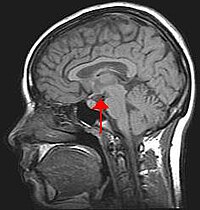
miR-132 Regulates PTSD-like Behaviors in Rats Following Single-Prolonged Stress Through Fragile X-Related Protein 1
Sign Up to like & getrecommendations! Published in 2020 at "Cellular and Molecular Neurobiology"
DOI: 10.1007/s10571-020-00854-x
Abstract: Fragile X-related protein 1 (FXR1) is a member of the fragile X family of RNA-binding proteins, which regulates a number of neurological and neuropsychiatric disorders such as fragile X syndrome, and is expected as a… read more here.
Keywords: protein; mir 132; like behaviors; stress ... See more keywords

Non-selective orexin-receptor antagonist attenuates stress-re-stress-induced core PTSD-like symptoms in rats: Behavioural and neurochemical analyses
Sign Up to like & getrecommendations! Published in 2021 at "Behavioural Brain Research"
DOI: 10.1016/j.bbr.2020.113015
Abstract: Post-traumatic stress disorder (PTSD) is a psychological disorder affecting many around the world. Growing evidence suggests that orexin-A is involved in the pathophysiology of depression and panic anxiety disorder. However, the role of orexin-A in… read more here.
Keywords: orexin; stress stress; stress; like symptoms ... See more keywords

Post-traumatic stress disorder increases pain sensitivity by reducing descending noradrenergic and serotoninergic modulation
Sign Up to like & getrecommendations! Published in 2021 at "Behavioural Brain Research"
DOI: 10.1016/j.bbr.2021.113367
Abstract: Exposure to stress might influence pain sensitivity; however, little is known about whether post-traumatic stress disorder (PTSD)-like symptoms alter pain sensitivity and how it can happen. Male rats were exposed to the inescapable footshock paired… read more here.
Keywords: post traumatic; pain sensitivity; sensitivity; stress ... See more keywords

Anti-PTSD-like effects of albiflorin extracted from Radix paeoniae Alba.
Sign Up to like & getrecommendations! Published in 2017 at "Journal of ethnopharmacology"
DOI: 10.1016/j.jep.2016.12.028
Abstract: ETHNOPHARMACOLOGY RELEVANCE Post-traumatic stress disorder (PTSD) is a severe psychiatric disorder that is characterized by symptoms of re-experiencing, avoidance and hyperarousal, as well as social and professional dysfunction at least one month after the exposure… read more here.
Keywords: extracted radix; like effects; anti ptsd; ptsd like ... See more keywords

Co-treatment of piracetam with risperidone rescued extinction deficits in experimental paradigms of post-traumatic stress disorder by restoring the physiological alterations in cortex and hippocampus
Sign Up to like & getrecommendations! Published in 2019 at "Pharmacology Biochemistry and Behavior"
DOI: 10.1016/j.pbb.2019.172763
Abstract: Pharmacotherapy and cognitive behavioral therapy, both fail to treat post-traumatic stress disorder (PTSD) in a considerable number of populations. The persistence of traumatic memories and deficit in extinction contributes to the failure of exposure therapy… read more here.
Keywords: piracetam risperidone; stress; extinction; ptsd like ... See more keywords

Early intervention with electroacupuncture prevents PTSD-like behaviors in rats through enhancing hippocampal endocannabinoid signaling
Sign Up to like & getrecommendations! Published in 2019 at "Progress in Neuro-Psychopharmacology and Biological Psychiatry"
DOI: 10.1016/j.pnpbp.2019.03.018
Abstract: Electroacupuncture (EA) is a clinically useful physiological therapy that has been recently adopted to treat several brain disorders. However, the potential role of early EA intervention in the prevention of posttraumatic stress disorder (PTSD) as… read more here.
Keywords: intervention; ptsd like; early intervention; dagl cb1r ... See more keywords

Cerebellar and multi-system metabolic reprogramming associated with trauma exposure and post-traumatic stress disorder (PTSD)-like behavior in mice
Sign Up to like & getrecommendations! Published in 2021 at "Neurobiology of Stress"
DOI: 10.1016/j.ynstr.2021.100300
Abstract: Mitochondrial metabolism is increasingly implicated in psychopathologies and mood disorders, including post-traumatic stress disorder (PTSD). We recently reported that mice exposed to a novel paradigm for the induction of PTSD-like behavior displayed reduced mitochondrial electron… read more here.
Keywords: post traumatic; metabolic reprogramming; like behavior; stress ... See more keywords

αCaMKII in the lateral amygdala mediates PTSD-Like behaviors and NMDAR-Dependent LTD
Sign Up to like & getrecommendations! Published in 2021 at "Neurobiology of Stress"
DOI: 10.1016/j.ynstr.2021.100359
Abstract: Post-traumatic stress disorder (PTSD) is a psychiatric disorder that afflicts many individuals. However, its molecular and cellular mechanisms remain largely unexplored. Here, we found PTSD susceptible mice exhibited significant up-regulation of alpha-Ca2+/calmodulin-dependent kinase II (αCaMKII)… read more here.
Keywords: lateral amygdala; ltd; like behaviors; camkii ... See more keywords

Pre-trauma Methylphenidate in rats reduces PTSD-like reactions one month later
Sign Up to like & getrecommendations! Published in 2017 at "Translational Psychiatry"
DOI: 10.1038/tp.2016.277
Abstract: In basic research, the etiology of fear-related pathologies, such as post-traumatic stress disorder (PTSD), is conceptualized using fear-conditioning protocols that pair environmental stimuli (that is, a conditioned stimulus—CS) with an aversive, unconditioned stimulus (US) to… read more here.
Keywords: like reactions; month later; fear; pathology ... See more keywords

Inhibiting Brd4 alleviated PTSD‐like behaviors and fear memory through regulating immediate early genes expression and neuroinflammation in rats
Sign Up to like & getrecommendations! Published in 2021 at "Journal of Neurochemistry"
DOI: 10.1111/jnc.15439
Abstract: Post‐traumatic stress disorder (PTSD) is characterized by depression/anxiety and memory failure, primarily fear memory. According to the reports, neuroinflammation and synaptic plasticity can play a role in the neurophysiological mechanisms underlying PTSD. Bromodomain‐containing protein 4… read more here.
Keywords: neuroinflammation; fear memory; like behaviors; brd4 ... See more keywords

Fear response-based prediction for stress susceptibility to PTSD-like phenotypes
Sign Up to like & getrecommendations! Published in 2020 at "Molecular Brain"
DOI: 10.1186/s13041-020-00667-5
Abstract: Most individuals undergo traumatic stresses at some points in their life, but only a small proportion develop stress-related disorders such as anxiety diseases and posttraumatic stress disorder (PTSD). Although stress susceptibility is one determinant of… read more here.
Keywords: response based; stress susceptibility; stress; fear response ... See more keywords